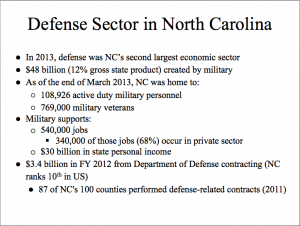Staff from North Carolina Congressional offices, representatives from Governor Pat McCrory’s Washington office, and individuals representing North Carolina-focused businesses gathered in a Capitol Hill meeting room on Friday morning to learn more about the North Carolina in the Global Economy (NCGE) project, a Duke-created website that provides information and insight into North Carolina’s traditional and emerging industries.
Dr. Gary Gereffi, professor of sociology and director of the Center on Globalization, Governance, and Competitiveness at Duke, heads up the project and led Friday’s presentation.
The purpose of the OFR and Duke in Washington-sponsored briefing was threefold:
- To inform policymakers and business leaders with an interest in the current and future state of North Carolina’s economy of the wealth of data available in the web-based NCGE resource;
- To demonstrate the policy implications that can be drawn from information stored in the site; and
- To preview upcoming additions to the site and highlight the value of further expansion of the project.
NCGE as a Resource
During the presentation portion, Dr. Gereffi explained that the NCGE website is a value chain analysis of seven key industries in North Carolina: tobacco, textiles & apparel, furniture, IT, biotechnology, banks & finance, and hog farming. This analysis includes charts, tables, and maps on numerous data points for each industry (and sub-sector within each), such as average wages, exports, employment numbers, geographical locations of individual businesses, and more.
Beyond the site’s value as a data repository for these select industries, Gereffi stressed that the goal of the site is to “provide useful data and engaging visualizations for better decision making by policy makers.” This in turn leads to “more good jobs and innovation, and improved competitiveness in the state,” said Gereffi.
In other words, the purpose of NCGE is to serve as a resource to individuals and institutions who want the best for North Carolina’s future.
Policy Implications: North Carolina’s Manufacturing Wage Gap
Beyond housing data important to understanding North Carolina’s position in the U.S. and global economy, the NCGE project also allows for greater insight for policymakers who may be evaluating potential strategies for growth.
Dr. Gereffi, along with his colleague Aaron Sydor, drilled down into NCGE’s data and earlier this month published their findings in a research brief, “North Carolina’s Manufacturing Wage Gap.”
Gereffi gave an overview of this research brief during Friday’s meeting, defining the leading causes of North Carolina’s manufacturing wage gap (a high share of jobs in low-wage industries, fewer jobs in higher paying industries, and North Carolina’s low wage rates in comparison to similar industries elsewhere in the U.S.), and sharing specific “upgrading strategies” (various factors involved in attracting a different industry mix to the state) that could help close the gap and in turn improve the standard of living in North Carolina.

Project Expansion and Research Suggestions
Students in an undergraduate course that Gereffi taught last year as part of the Bass Connections program populated the current NCGE site with data from 1992-2012. In the 2014-2015 academic year, students will be helping to expand NCGE to include two additional industries important to North Carolina: defense and aerospace.
Dr. Gereffi pointed out during his presentation that defense was North Carolina’s second largest economic sector in 2013, and the state ranked 10th in the nation for Department of Defense in-state spending. With those kind of numbers, the need for including the sector in the NCGE project is apparent.
In addition, this research would include “identify[ing] opportunities for high-tech, high-wage, or R&D related activities in North Carolina,” said Gereffi.

Of course, defense and aerospace are just two of numerous additional industries that should be included in the project to give a complete view of North Carolina’s economy. “At this point,” said Gereffi, “we are only limited by resources and capacity.”
After the presentation, attendees participated in a Q&A discussion, and many stayed after the formal program to speak with Dr. Gereffi about his work.



